If you’ve been walking or driving around the revitalized and thriving downtown Durham, North Carolina, in the past year or so, then sightings of a colorful, pedal- and sun-powered trike called the ELF won’t surprise you. As described on Organic Transit’s website, the ELF is the company’s first product and already a big hit: “The ELF is a solar and pedal hybrid vehicle powered by you and the sun. It’s a revolution in transportation and gets the equivalent of 1800 MPG. Hand built in the USA, the ELF is legally a bicycle, so it can travel on bike paths, park on sidewalks and requires no gas, license, registration or insurance. It can travel up to 20 mph on electric power only and up to 30 mph when combined with pedaling. It can hold more than a dozen bags of groceries and can handle an amazing 350 lb. payload.
What’s also cool is that this innovative company has been collaborating since the beginnings of the ELF “project” with another forward-thinking Durham company, ShopBot Tools. More on that relationship in a moment; first you really need to take a look at the ELF in action. This is a good piece from UNC-TV from June of 2013; the design of the ELF has evolved some from what you see in this news story, but take a ride…
As noted on Organic Transit’s site, the ELF features: “a beautiful Trylon composite body combined with rugged carbon fiber provides weather protection, visibility in traffic and is much safer than a bicycle. Advanced LED headlights, brake lights and turn signals make the commute, trip to the grocery store or coffee shop fun and safe. The 100 watt flexible solar panel assures charging assistance anywhere the sun shines.”
“Because of the radically efficient design, the ELF is the cleanest possible mode of transportation for the environment. If the ELF is used regularly, it can prevent as much as 6 tons of CO2 from entering the atmosphere each year. That is the equivalent of a 100% solarized home at a fraction of the cost!”
“The healthy, efficient, economical, weather protecting, cargo carrying ELF is perfect for commutes, resorts, shopping excursions, gated communities, college campuses and urban living. It is indeed a revolution in urban eco-mobility.”
How it all started.
The concept of the ELF is the brainchild of Organic Transit’s Founder and CEO, Rob Cotter — and the idea has been stewing for a long time. Rob started out in California working on Porsche and BMW race cars. Not far away, Dr. Paul MacCready built the Gossamer Condor, a pedal powered aircraft. Rob become fascinated with the technology and built a 60 mph pedal powered trike. Highway speeds at fractional horsepower became an obsession. Rob became VP of the International Human Powered Vehicle Association and directed the first solar car race in the US. With support from GE and DuPont to develop composite and thermoforming technologies, Rob built or contributed to numerous innovative vehicles. After consulting on Bike Sharing technology for NYC, it became apparent there was now a viable market for an ultra-efficient vehicle that was between a bicycle and a car. That was the beginning of the ELF.
The ELF gained serious traction as a Kickstarter project meant to create buzz, early interest, and funding for a first production run of ELF vehicles. Rob expresses his team’s early passion for this project on the Kickstarter page: “We dreamt of a world in which people and goods could move from place to place cleanly and efficiently. We pictured a vehicle powered by humans and the sun that would revolutionize transportation as we know it. We called on a hugely talented group of friends to get involved; between us we have more than 100 years experience designing and building solar cars, bikes, and other human powered vehicles.”
Rob says, “Together we set about putting ideas to paper. Over the course of a year, we came up with a design that was both stylish and efficient and brainstormed ways in which such a vehicle could change the world.”
Rob describes some of the early process, where the ShopBot first played a role in prototyping the ELF. “Making a model out of foam core and wooden struts is one thing, but making a body that can be used on a moving, functional vehicle is a whole different story. Once the team had convened and constructed and adjusted and tweaked it was time to turn the refined design into something more substantial.”
“We hired an industrial designer named Ermanno who took advantage of his membership at Tech Shop Raleigh-Durham to turn the CAD renderings into a full sized foam plug on a ShopBot CNC tool. Hundreds of hours of shaping and sanding later, the plug was coated with auto body paint to give it a smooth glossy finish that would be easy to pop out of a composite mold.”
Fast-forward to today: the Kickstarter is successfully behind them, well over a hundred or so ELFs have been shipped out to customers worldwide, and Organic Transit has moved a few blocks away from its original location. We caught up with Rob to talk about his vision of the company, its ongoing collaboration with ShopBot Tools, and his ideas for the future.
Rob: “As I mentioned we used the ShopBot in the early prototyping of the ELF, and since then we’ve acquired our own full-size ShopBot CNC tool and are using it in a variety of ways. We cut several of the flat panels for the inside and outside of the ELF; these tasks alone, cut on the ShopBot, save us hundreds and hundreds of hours over performing the cuts manually. We are also using our ShopBot to quickly create less-expensive molds for the vacuum-forming process, and also to cut quick dimensional models of our new product ideas. We’re looking forward to continuing to collaborate with ShopBot; their production team is really good at helping people improve upon various steps in the manufacturing process.” 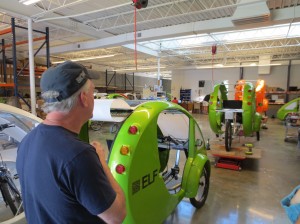
“We’re more a design firm than a manufacturer” When asked of his vision of the company and the possibilities for other new transportation solutions, Rob responds, “We view our business as designers; we’re driven by a passion to come up with useful new products for people and planet, with an eye toward how we can help people live healthier, reduce their carbon footprint, and ultimately save money along the way by using a more efficient form of transportation.”
When it comes to manufacturing, Rob says, “I want to do my part to enable local manufacturing. For instance, if you view this in a more traditional sense, scaling up might for example involve investing in a million-dollar vacuum forming tool, or outsourcing manufacturing overseas. But why go these routes when you can buy a used tool sitting idle in Ohio for 15 thousand dollars, bring in an expert to set it up, and find a space for it in a town that could use the economic boost. Right now we’re looking to do just this in North Carolina, and bring some good new jobs to a rural area.”
Ted Hall, ShopBot’s Founder and CEO, is excited to work alongside Organic Transit and is a big believer in this forward-looking view of manufacturing. “Our mantra at ShopBot has been to make the power of digital fabrication technology more readily accessible and usable by anyone. We make affordable tools that empower starting and growing a business. We love to see new technologies being put to work in innovative ways, and helping create new jobs.”
One possibility for the future of the ELF is to see it utilize the distributed manufacturing model. Rob notes, “I could envision one day soon shipping the pieces and parts of an ELF in a crate, along with an instruction manual, to someone participating in the 100kGarages.com network who owns a ShopBot tool. They could build their own ELF.”
Ted added, “You could also one day start to ship the ELF parts overseas to a FabLab in a less developed area of the world. FabLabs are outfitted with ShopBot tools and a whole array of digital fabrication tools, to help enable local manufacturing globally.”
This video is a good summation of Rob’s view of how Organic Transit can contribute to people and planet…
And finally here’s a recent review of Organic Transit’s latest model, the ELF 1.5, by ElectricBikeReview.com:
Learn more about the management, research & development, and design team at Organic Transit at their website. To find out more about ShopBot’s full-size CNC tools, click here. As mentioned in this story, ShopBot Tools provides custom production support services for manufacturers; learn more about how we can help you here.
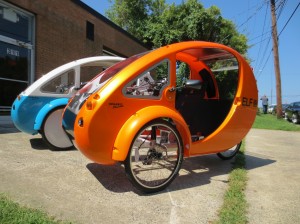

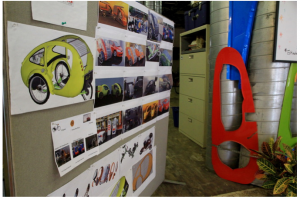
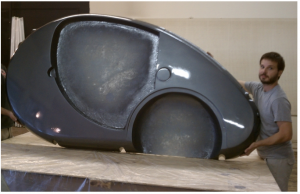
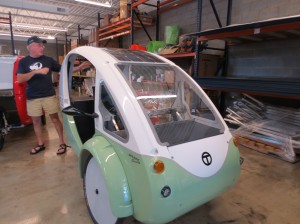
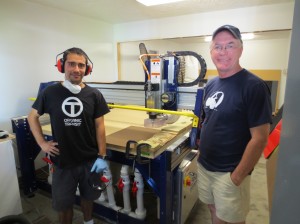
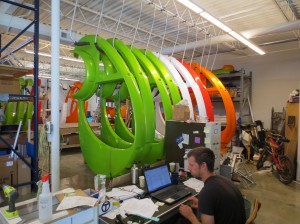
really like this bike, and could send a catalog and if possible the cost to ship to Brazil
Jose, Thanks for your interest! I will pass along your email address to the folks at Organic Transit; they will be better able to answer your question about shipping. Meanwhile I’d recommend looking at OrganicTransit.com, as there may be answers there as well.